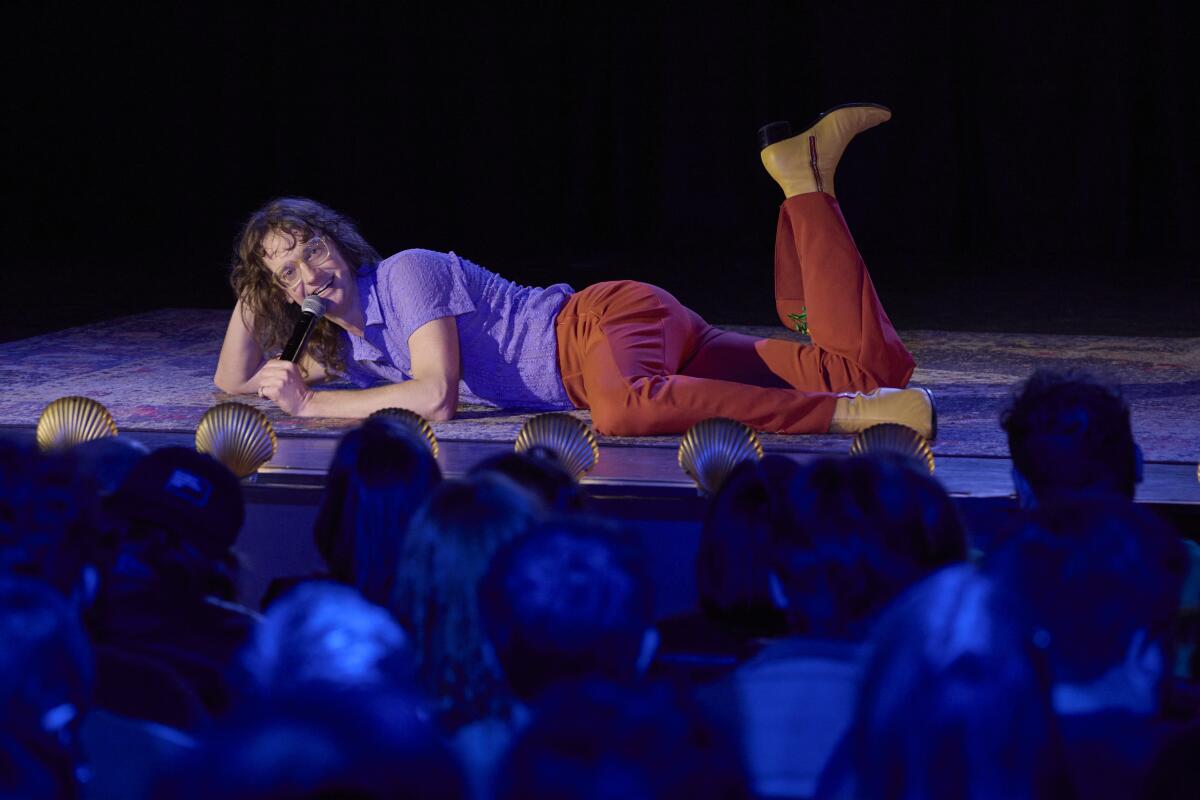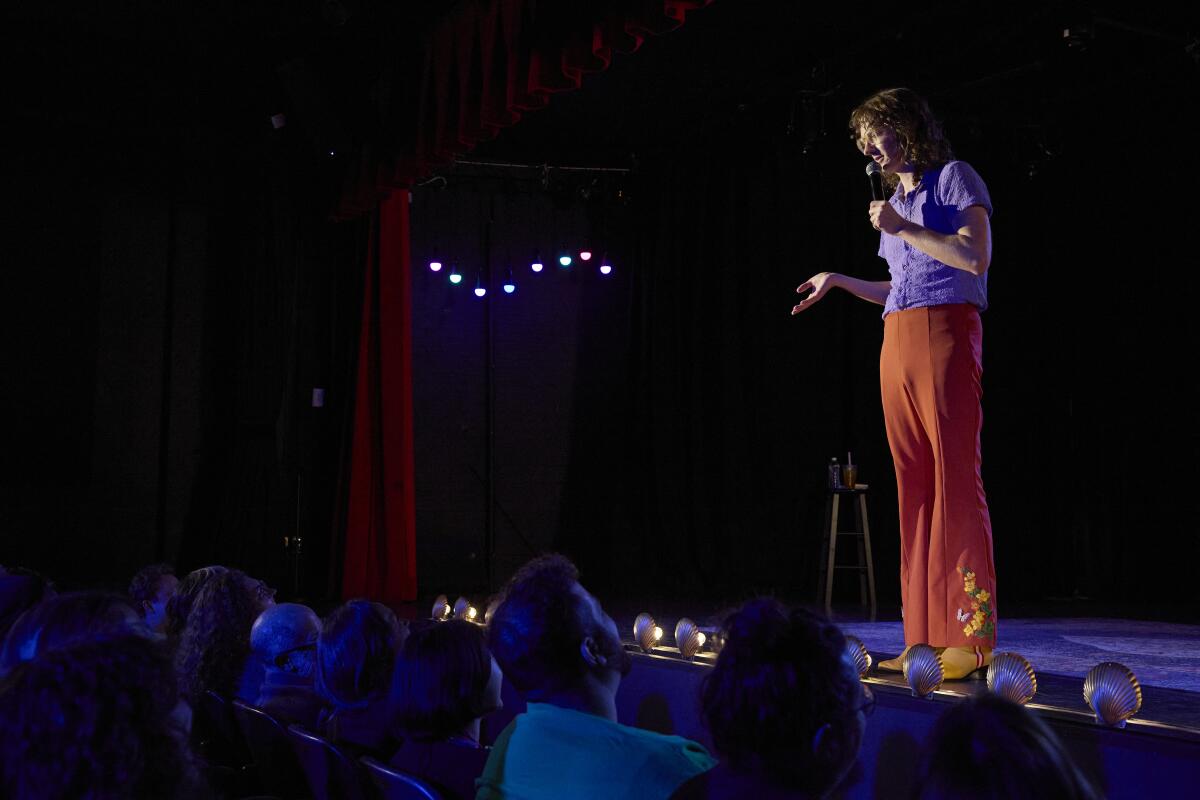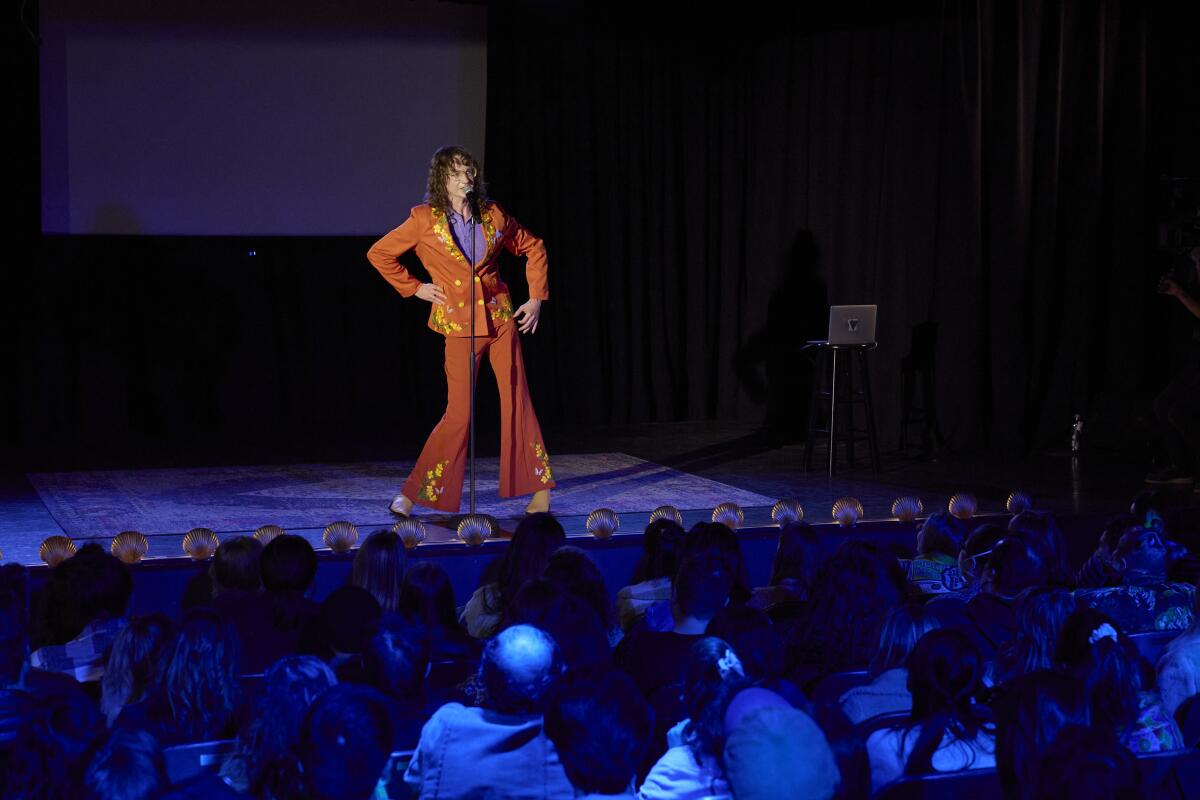Chris Fleming roasts convention as a comedian-to-the-freaks in ‘HELL’

“How well does Chris’ stand-in know the show? Can he do the set if we send Chris to heaven?” deadpans Chris Fleming’s agent, played by Rachel Crowe, during the opening sketch of the comedian’s new special “HELL” now streaming on Peacock. He’s just crashed into a staircase, his legs askew, in what the stage manager refers to as a “Winnie the Pooh in Rabbit’s house” situation.
It’s one of many instances in which Fleming highlights the hellish nature of performing comedy in comparison to how it’s portrayed in most comedy specials. “There’s always that slo-mo walk of the comic walking to the stage. It’s this very rock ’n’ roll thing,” Fleming said. “The reality is much bleaker! There’s really nothing sexy about the stuff that surrounds performance.”
Fleming’s comedy has garnered enormous popularity over the past 10 years for his hilarious, oddball videos (“Company Is Coming,” “Boba Manifesto,” “Polyamorous,” “The Normies Are Getting Creative”). Given the specificity of his comedic voice, it is unsurprising that Fleming aimed for his special to be different from other specials.
“I didn’t want it to be just like a flex. Comedians think, ‘Oh, you gotta go do a big theater and do this tried-and-true set,’” he said. “I wanted people to see me struggle and to feel like, ‘Oh, is this gonna work?!’” Rather than using well-trodden material, he performed a number of jokes that he wrote the day he filmed. And he allowed for the show to include many topics and tones, instead of focusing on a single, overarching subject. “Comedy specials are all so one-man-show-y, with a unified theme, like death.” That isn’t Fleming’s modus. “I’m too tangential. For me, the point is the frosting of the cake.”
Several sketches are interspersed throughout the stand-up portions of the special, filmed at Los Angeles’ intimate Dynasty Typewriter, alongside musical numbers and visual aids. “I once heard Noel Fielding say, ‘Unless you’re Richard Pryor, you’re gonna get boring just doing an hour with the microphone,’” Fleming noted. In “HELL,” the diversity of forms keeps the show alive. “Adding in little other things like songs helps give the audience a new breath in the laughter. Plus it kind of buys you more time,” he explained.

Fleming started performing stand-up when he was 16 years old at the Comedy Studio in Cambridge, Mass. “There were all these wild performers. And the audience rewarded people leaning into their idiosyncrasies.”
The comedian’s work was not always so unconventional, however. When he first began, Fleming didn’t feel weird enough. “I had a complex that I was too not alt. I felt like Rob Thomas,” he recalled. “There were all these people going wild around me and I felt really straitlaced.”
Fleming also didn’t yet don his signature style— long hair with bangs hair and colorful, flashy clothing. “I would go to the store next to the club and look at books about Mick Jagger and Bowie and Stevie Nicks and I was like, oh yeah, this is the s— I wanna do. It took me moving to L.A. to actually be comfortable wearing that style. But I couldn’t do it in Massachusetts. ’Cause Massachusetts woulda killed me!”
Since he started performing, Fleming has used his physicality to augment and exaggerate bits. “I’ve always been a physical performer,” he said. “If I don’t do a physical set, I feel that I have failed.” “HELL” begins with an elaborate, jazzy dance. In various moments he trots across the stage to emphasize a point. And he does several extended physically acted-out segments. “A lot of it is just the nature of having a lanky body.” (Comedian Craig Robinson recently quipped about Fleming, “With a body like that, thank God he found comedy.”)
Using movement onstage is a crucial part of Fleming’s work. He carefully choreographs the physical aspects of his sets. “We only have like five tools onstage, and one’s a stool, you know? You better use your legs, dude!”
During the special, Fleming jokes that rock stars ought to quit while they’re ahead. If they’re too wealthy and enabled, the creativity ceases. “Once you’ve been given an all-access pass to exotic wildlife, you can’t in good faith keep contributing to the American songbook. You’re gonna write ‘Elevation’ by U2!” The comedian then proceeds to hop ecstatically across the stage with one leg akimbo: “That song was penned with a toucan’s beak dipped in ink while riding a zebra side-saddle.”
Later, Fleming jokes, “This is gonna make me sound Republican, but the attitude that birds have toward bird baths, there’s an entitlement there.” He then speaks of a bird landing in a half-full tub, doing a “really performative look around.” At which point Fleming gets on the ground and turns in circles while attempting a half-headstand breakdance routine. “And they look at you really accusatory, like, ‘Are we gonna do something about it?!’”
Fleming’s use of improvisation in the stand-up segments of “HELL” makes the show feel extra madcap. “I wanted to keep it loose and not have it be this, like, perfect hour.” The very first line of the show is off-script, to an audience member in the front row: “You dropped your popcorn in my honor?!” He later jokingly chastises the camera operator for filming the audience instead of him: “Am I that disinteresting to you? You’re filming someone’s husband who’s not even having a good time!”
Toward the end of the show, Fleming notices an unoccupied seat in the front row and makes a prolonged bit out of it. “Has this been empty the whole time? Brutal. All right, just so it looks like a sold-out show, get a couple shots of just me.” Fleming then removes his glasses and borrows a woman’s purse so he supposedly doesn’t look like himself (“No one’s gonna know”). He eventually returns to the stage wearing the satchel around his neck “like an oat bag,” and looks straight to camera: “Is this gonna be a continuity issue? The producers are like, ‘Chris, put the oat bag down! Put the oat bag down! We cannot blend the shows! Chris!’” Fleming completes the chunk by wildly swinging the sack around. “I don’t give a s— anymore! I don’t give a f—!” He later sweetly admitted in our interview, “I actually care very much.”
A large part of Fleming’s comic voice entails making fun of those on top, such as his massively popular video musings about why people fan over celebrities like Adam Driver (he’d save you from drowning) or Taylor Swift. The critique of the status quo achieved fever pitch in Fleming’s music video “The Normies Are Getting Creative,” released during the pandemic: “Hiking couples who exercise together whose sole communication is asking ‘You OK, babe?’ They’re now writing novels!”
“HELL” includes a long section lampooning people who enjoy a popular outdoor party game: “If you’ve ever played cornhole comfortably, you’re on the side of the oppressor.” He goes on, “If you’ve ever walked into a backyard space and seen these heinous trapezoids impossibly far apart from each other and felt anything outside of abject existential dread, I’m sorry, you’re probably an OK person, but you are not a liberal. AOC would walk into this space and say WHAT ARE WE DOING?!” When asked about his relationship with the mainstream, Fleming laughed. “I’m all bravado onstage talking about it, but I’m very quietly uncomfortable in these cornhole situations. I’d do it like anyone else. And then the fantasist in me later will right the wrongs, color in my past. It’s healing to talk s—!”
Fleming even makes fun of the “normies” within the comedy world. Once she decides to “execute Chris” right before his show, the comedian’s fictional agent considers gifting the already rented theater to more mainstream performers. “Maybe we just stick around and shoot Nikki Glaser’s new special ‘Two in the Pink.’ Or Bert Kreischer’s ‘Ass Man.’” Solid burns to those knowledgeable about club comics. And also a slight on Fleming, who, at that moment in the show, doesn’t seem like he’ll be able to make it like these top-billed comedians.
Fleming categorizes his audience as not-normie but rather weirdos and freaks like him. “Someone said to me recently after a show, ‘Chris, can you say hi to my wife?’” Fleming was stunned. “You have a wife and you came to see me?! This is not for people with wives! If you have a wife, go see Mike Birbiglia! This is for theater people who don’t get cast!”

And, of course, he makes fun of corporate fat cats, who in the special are represented by a man called … Tom Fat Cat. His rail-thin arms are engineered by puppeteers. He has a degree from LAX. And he has ideas! He’s played by Fleming himself, whom he convinces to become a brand ambassador for additional days of the week, with disastrous effects. “Time augmentation is no f— joke.” Fat Cat also flaunts the special’s dismal ratings before it’s even been released. “Horses hate it. The inmates of Rikers Island had a vote and they chose the TV Guide channel over this!”
Sometimes Fleming’s work is a social critique, and sometimes it’s just silly. The comedian discovered that rodents are extremely affordable pets. “I found that you can get a gerbil for four dollars and 99 cents,” he said. “That’s the price of raspberries. So as a consumer you have to ask yourself a pretty important question. Should I get a Driscoll’s, or should I get a gerbil?” Fleming then proceeds to sing an entire song about this subject matter: “So let me get this straight, if I’m a child and I save up my earnings for 20 minutes of chores, then I can afford a tiny new member of my family. The gerbil. But should I get a Driscoll’s?” The number resulted in the biggest applause break of the entire show.
While “HELL” has many entertaining, absurdist moments, Fleming is in fact very thoughtful about how he pieced together the special. He felt strongly about including deeper subjects in order to balance the lighter parts of the show. These include his need for validation; his attempts at introspection; and the ways in which Irish Catholics are “doomed emotionally” (“a big part of my culture is the idiocy that we have around therapy”). In one bit he tells us that he recently admitted to his mother that he’s been struggling with anxiety and depression. Fifteen minutes later she earnestly asked: “Chriiiiiiis? Are you feeling better?!”
Fleming believes that a bit of gravitas is essential in his work. “I think as an Aquarius, people wanna drag my legs back down to the earth,” he said. “My work can be kind of tedious if I’m not grounded in some way and tethered to the human experience.”
He has learned that his work requires at least some sincerity, so it’s not simply conceptual. “If it’s just a concept people aren’t gonna feel the heart.” In fact, adding humanity to his work allows Fleming “a longer leash for absurdity.” He aims to actually share with and connect to his audience. “There is definitely a goal of showing my real self and not just my clown, you know?” Yes, please. We weirdos want it all.
The interview for this article took place before the start of the SAG-AFTRA strike.
More to Read
The biggest entertainment stories
Get our big stories about Hollywood, film, television, music, arts, culture and more right in your inbox as soon as they publish.
You may occasionally receive promotional content from the Los Angeles Times.












